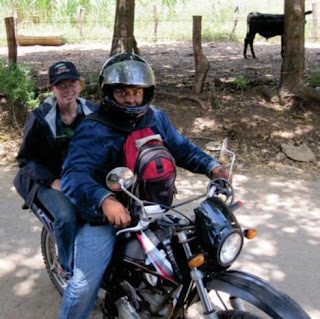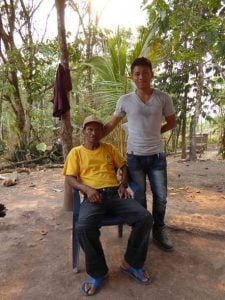 The original concept of my Fulbright project was to strengthen the link between technical and financial resources available to small farmers in Nicaragua to promote more sustainable farming practices. My contacts included the National Autonomous University (UNAN) and the Center for the Promotion of Local Development (CEPRODEL), a micro-finance institution. A reforestation project involving the two institutions was already in the works, and by mid-April I was working full time organizing trainings and processing the participating farms’ evaluations.
The original concept of my Fulbright project was to strengthen the link between technical and financial resources available to small farmers in Nicaragua to promote more sustainable farming practices. My contacts included the National Autonomous University (UNAN) and the Center for the Promotion of Local Development (CEPRODEL), a micro-finance institution. A reforestation project involving the two institutions was already in the works, and by mid-April I was working full time organizing trainings and processing the participating farms’ evaluations.
With faculty from the Agroecology Department at UNAN, we organized trainings for the families of 24 CEPRODEL clients in soil conservation, organic fertilizers, organic pest control as well as proper establishment and care of trees. We emphasized the importance of ecological and financial sustainability through long-term business planning.
Teaching the workshops and following up with technical assistance required us to stay with participating families in the countryside. I have been warned by all my Nicaraguan friends that life in the country is very rough. The roads are often in terrible condition and are notorious mud traps during the rainy season. On our way out to the community, our pickup truck slid sideways, and we found ourselves jammed into a soft bank of mud with the back wheels elevated, completely blocking the road on the first day of trainings. After we tried to free the truck futilely using tree branches, 4-wheel-drive and pushing, a neighbor accomplished the task with his two oxen in minutes.
I was prepared for stark poverty, no electricity, no running water, simple meals and lots of mosquitoes. All of the above proved true. What I wasn’t prepared for was a host family so generous they hunted iguanas and killed a sheep so that we would eat meat instead of just beans, finding that my mosquito net was more useful in keeping bat dung off my bed than protecting me from mosquitoes and realizing that tropical ant bites hurt a lot more than mosquito bites. After the workshops ended, I spent my evenings with the family’s children, trying fruits growing wild in the nearby woods, exploring a river with waterfalls and rapids, making compost piles and helping to clear the acres of brush where trees from the reforestation project will be planted.
After several nights of long conversations by candlelight with my host family about my life in the States and the differences between our cultures, I began to realize that what I want this project to become is more than the strengthening of technical and financial resources available to Nicaragua’s small farmers. Instead of feeling deprived and being labeled poor, I want them to admire their beautiful land, to treasure the abundant natural resources and to be proud of the riches they are passing on to their children. Like the oxen who proved much more effective than our pickup truck in the mud, many elements of rural life are undervalued in our current society. In addition to changing our fiscal practices to work toward a just world, we need to change our value system to include the priceless riches of rural life.

Linking technical assistance with financial credit has helped Pedro Mendoza (left) maintain an impressive diversity: he farms cattle, five different grains and vegetables, three different fruits (including cashew) in addition to producing organic compost and honey. Along with providing loans to buy seeds and calves, CEPRODEL has helped him find new markets for his crops and improve the genetic makeup of his cattle herd.

Technical assistant Vernonn Berios and I use a motorcycle to visit as many clients as we can in one day and navigate the dirt roads that larger vehicles can’t access. Limited transportation options hinder market access for small farmers who sometimes have to travel whole days with oxen to reach a market.
Top photo: Engaging the reforestation project families in project and educational activities, especially young children, promotes an ongoing community dialogue about sustainable farming practices such as making compost piles and helps ensure their implementation.
To read more about Rachel Lindsay’s Fulbright experiences, please visit her blog.





